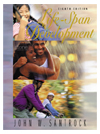 |  Life-Span Development, 8/e John W. Santrock,
University of Texas - Dallas
Early Childhood Physical and Cognitive Development in Early Childhood
Chapter ObjectivesI.Understand the changes in height and weight during the preschool years and note factors associated with individual differences in height and weight. |
 |  |  | II.Define myelination and discuss its contribution to brain development. |
 |  |  | III.Explain how gross motor skills and fine motor skills change during the preschool years and the role that handedness plays in motor skills and intellect. |
 |  |  | IV.Define basal metabolism rate (BMR), and explain why early exposure to fast food worries developmentalists. |
 |  |  | V.Discuss the state of illness and health in the world's children, including the leading cause of childhood death in the world, relevant treatment, and prevention. |
 |  |  | VI.Define Piaget's preoperational stage and be able to give examples of behaviors that differentiate children in the symbolic function and intuitive thought substages. |
 |  |  | VII.Explain Vygotsky's theory of development, including the zone of proximal development (ZPD), scaffolding, language and thought, and the educational applications of Vygotsky's theory, and compare Vygotsky's theory with that of Piaget. |
 |  |  | VIII.Indicate what changes occur in attention, memory, and use of strategies in early childhood. |
 |  |  | IX.Explain the development of the young child's theory of the mind. |
 |  |  | X.Identify observations that indicate children understand rules of morphology, semantics, and pragmatics. |
 |  |  | XI.Compare and contrast the child-centered kindergarten with the Montessori approach, and discuss developmentally appropriate and inappropriate practices in educating young children. |
 |  |  | XII.Be able to answer the question, "Does preschool matter?" by addressing developmental consequences for all children, including those who are economically disadvantaged. |
|



 2002 McGraw-Hill Higher Education
2002 McGraw-Hill Higher Education